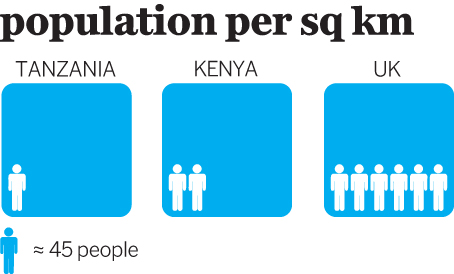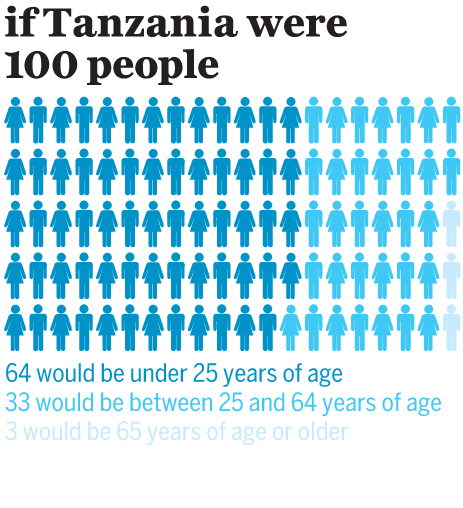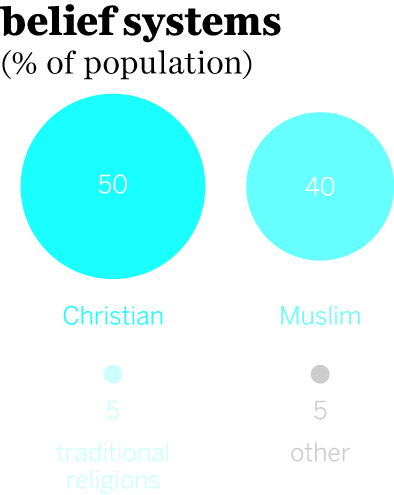Tanzania Today
Tanzania today is moving fast and looking towards the future. Its urban areas are growing, it is one of Africa's top tourist destinations thanks to its national parks, and it possesses natural gas and mineral resources. Politically, the country's focus is on its new president, Dr John Magufuli, who is moving full steam ahead to eradicate corruption and yank Tanzania up by the bootstraps – to widespread acclaim in many quarters, accompanied by dismay in others at his hardline approach.
Nyerere's Legacy
Just past its half-century mark, Tanzania is still indebted to Julius Nyerere, who was at the country’s helm for the first 25 years of its existence. Impelled by an egalitarian social vision, Nyerere introduced Swahili as a unifying national language, instilled ideals of ujamaa (familyhood) and initiated a tradition of regional political engagement. Thanks to this vision, Tanzania today is one of East Africa’s most stable countries, and religious and ethnic conflicts are minimal.
Economic Challenges
On the economic front, the news is mostly good. Tanzania has been enjoying steady economic growth in recent years, and large natural gas reserves along the southeastern coast plus significant mineral resources in the north and west hold the potential for transforming its economy over the coming decades. However, major challenges remain. Tanzania is ranked near the bottom of the United Nations Development Programme's Human Development Index (151st out of 188 countries in the 2016 listing), and daily life for many remains a struggle. Unemployment averages about 10% and underemployment is widespread. Short-term austerity measures by the new government plus greatly stiffened revenue collection and regulatory measures mean that many Tanzanians are feeling an economic pinch. Yet if President Magufuli's plans are realised, the country may well experience an economic leap ahead within the next decade.
Shadow of Corruption
A major impediment to real progress has been corruption. In the most sweeping effort to date to combat it, President Magufuli has enacted tough anti-corruption measures, eliminating thousands of 'ghost workers' from government payrolls, firing anyone with even a suspicion of involvement in shady dealings, and in general succeeding in creating the seeds of a new mentality. Yet, while much progress has been made, there is still much to be done.
Family Squabbles
An ongoing challenge for the Tanzanian government is keeping ties happy between the mainland and the proudly independent Zanzibar Archipelago. While dialogue is generally amicable, the relationship requires ongoing attention. The most recent rough patch arose during the 2015 national elections, when the Zanzibar results – which were leaning towards the opposition Civic United Front (CUF) party – were suddenly annulled. The rerun elections held in March 2016 gave the ruling CCM a 91% majority on the islands, but were boycotted by most Zanzibaris.
A Lively Media
Tanzania’s lively media has traditionally played an important role in political debate. While most of the main dailies are aligned to some degree with the governing CCM, the mainland local press has some independence, and Tanzania is ranked ahead of its neighbours in press freedom by Reporters Without Borders.
That said, enforcement of several restrictive laws has been significantly stepped up by President Magufuli's administration. Fear of running afoul of these laws has resulted in self-censorship and a sense of jitteriness, and Tanzania's press freedom rankings have dropped several points since 2016 as a result. Finding a way to allow for democratic pluralism while at the same time maintaining a hardline approach to economic reform is proving to be one of the new government's biggest challenges.
Due to distribution difficulties in rural areas and a countrywide illiteracy rate of approximately 30%, the influence of newspapers is primarily limited to urban centres.
Education for the Future
Perhaps the most significant determinant of Tanzania's future will be its educational system. Recent government administrations have elevated education to greater prominence on the national agenda, and Nyerere's goal of universal primary education is close to being realised. However, in many parts of the country, especially in rural areas, quality and standards are low and drop-out rates high.
Recent efforts by President Magufuli's government to improve teaching standards by removing teachers without proper credentials have resulted in some short-term shake-ups, but with the promise of long-term benefits. Nationwide, the primary student-to-teacher ratio is about 46 to one. At the secondary level, there is a shortage of schools, and an overall enrolment rate of less than 30% countrywide. Less than 2% of the eligible population is enrolled in university.
Best in Print
The Gunny Sack (MG Vassanji; 1989) Growing-up memoir told through the contents of a gunny sack.
Memoirs of an Arabian Princess from Zanzibar (Emily Ruete; 1888) Autobiography of a Zanzibari princess.
The Tree Where Man Was Born (Peter Matthiessen; 1972) Lyrical account of northern Tanzania's people and landscapes.
Nyerere and Africa – End of an Era (Godfrey Mwakikagile; 2002) Comprehensive study of Julius Nyerere.
Lions in the Balance: Man-Eaters, Manes, and Men with Guns (Craig Packer; 2015) A behind-the-scenes look into lion conservation politics in Tanzania.
Best on Film
Africa – The Serengeti (1994) Classic images of the Serengeti plains.
Tumaini (2005) AIDS devastation in a Tanzanian family.
People of the Forest – The Chimps of Gombe (1988) Gombe's chimpanzees up close.
As Old as My Tongue (2006) Story of legendary Zanzibari singer Bi Kidude.
Bongoland (2003) The USA life of a Tanzanian immigrant.
These Hands (1993) Life in a quarry near Dar es Salaam for Mozambican women refugees.
Maangamizi – The Ancient One (2001) Chronicle of two women's inner journeys.
Population
52.5 million
Life Expectancy
63 years
Mobile Phones per 100 People
74
Internet Users per 100 People
5
Inflation
5.2%


